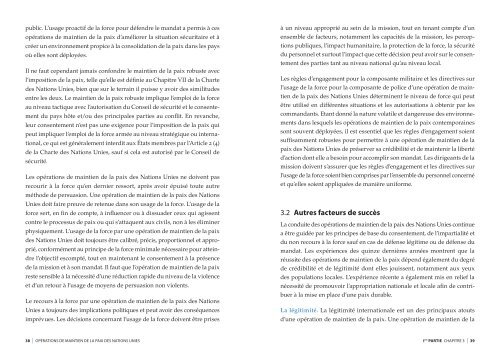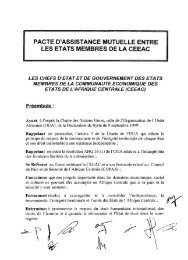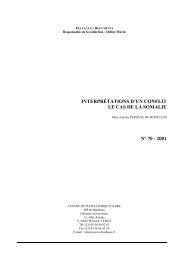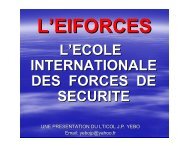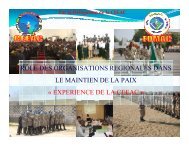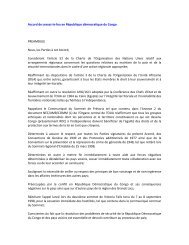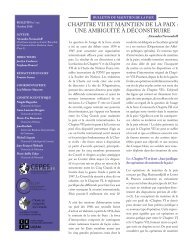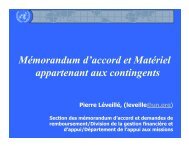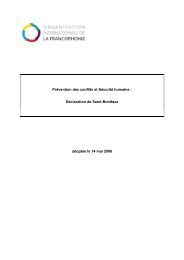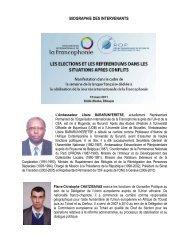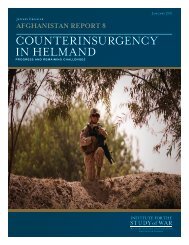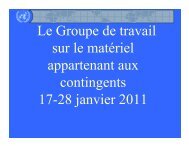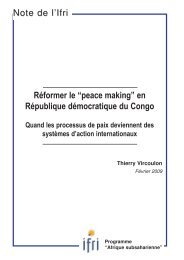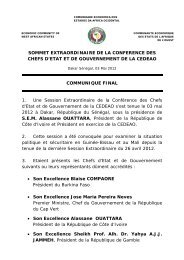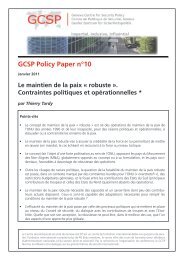Opérations de maintien de la paix des Nations Unies
Opérations de maintien de la paix des Nations Unies
Opérations de maintien de la paix des Nations Unies
Create successful ePaper yourself
Turn your PDF publications into a flip-book with our unique Google optimized e-Paper software.
public. L’usage proactif <strong>de</strong> <strong>la</strong> force pour défendre le mandat a permis à ces<br />
opérations <strong>de</strong> <strong>maintien</strong> <strong>de</strong> <strong>la</strong> <strong>paix</strong> d’améliorer <strong>la</strong> situation sécuritaire et à<br />
créer un environnement propice à <strong>la</strong> consolidation <strong>de</strong> <strong>la</strong> <strong>paix</strong> dans les pays<br />
où elles sont déployées.<br />
Il ne faut cependant jamais confondre le <strong>maintien</strong> <strong>de</strong> <strong>la</strong> <strong>paix</strong> robuste avec<br />
l’imposition <strong>de</strong> <strong>la</strong> <strong>paix</strong>, telle qu’elle est définie au Chapitre VII <strong>de</strong> <strong>la</strong> Charte<br />
<strong>de</strong>s <strong>Nations</strong> <strong>Unies</strong>, bien que sur le terrain il puisse y avoir <strong>de</strong>s similitu<strong>de</strong>s<br />
entre les <strong>de</strong>ux. Le <strong>maintien</strong> <strong>de</strong> <strong>la</strong> <strong>paix</strong> robuste implique l’emploi <strong>de</strong> <strong>la</strong> force<br />
au niveau tactique avec l’autorisation du Conseil <strong>de</strong> sécurité et le consentement<br />
du pays hôte et/ou <strong>de</strong>s principales parties au conflit. En revanche,<br />
leur consentement n’est pas une exigence pour l’imposition <strong>de</strong> <strong>la</strong> <strong>paix</strong> qui<br />
peut impliquer l’emploi <strong>de</strong> <strong>la</strong> force armée au niveau stratégique ou international,<br />
ce qui est généralement interdit aux États membres par l’Article 2 (4)<br />
<strong>de</strong> <strong>la</strong> Charte <strong>de</strong>s <strong>Nations</strong> <strong>Unies</strong>, sauf si ce<strong>la</strong> est autorisé par le Conseil <strong>de</strong><br />
sécurité.<br />
Les opérations <strong>de</strong> <strong>maintien</strong> <strong>de</strong> <strong>la</strong> <strong>paix</strong> <strong>de</strong>s <strong>Nations</strong> <strong>Unies</strong> ne doivent pas<br />
recourir à <strong>la</strong> force qu’en <strong>de</strong>rnier ressort, après avoir épuisé toute autre<br />
métho<strong>de</strong> <strong>de</strong> persuasion. Une opération <strong>de</strong> <strong>maintien</strong> <strong>de</strong> <strong>la</strong> <strong>paix</strong> <strong>de</strong>s <strong>Nations</strong><br />
<strong>Unies</strong> doit faire preuve <strong>de</strong> retenue dans son usage <strong>de</strong> <strong>la</strong> force. L’usage <strong>de</strong> <strong>la</strong><br />
force sert, en fin <strong>de</strong> compte, à influencer ou à dissua<strong>de</strong>r ceux qui agissent<br />
contre le processus <strong>de</strong> <strong>paix</strong> ou qui s’attaquent aux civils, non à les éliminer<br />
physiquement. L’usage <strong>de</strong> <strong>la</strong> force par une opération <strong>de</strong> <strong>maintien</strong> <strong>de</strong> <strong>la</strong> <strong>paix</strong><br />
<strong>de</strong>s <strong>Nations</strong> <strong>Unies</strong> doit toujours être calibré, précis, proportionnel et approprié,<br />
conformément au principe <strong>de</strong> <strong>la</strong> force minimale nécessaire pour atteindre<br />
l’objectif escompté, tout en maintenant le consentement à <strong>la</strong> présence<br />
<strong>de</strong> <strong>la</strong> mission et à son mandat. Il faut que l’opération <strong>de</strong> <strong>maintien</strong> <strong>de</strong> <strong>la</strong> <strong>paix</strong><br />
reste sensible à <strong>la</strong> nécessité d’une réduction rapi<strong>de</strong> du niveau <strong>de</strong> <strong>la</strong> violence<br />
et d’un retour à l’usage <strong>de</strong> moyens <strong>de</strong> persuasion non violents.<br />
Le recours à <strong>la</strong> force par une opération <strong>de</strong> <strong>maintien</strong> <strong>de</strong> <strong>la</strong> <strong>paix</strong> <strong>de</strong>s <strong>Nations</strong><br />
<strong>Unies</strong> a toujours <strong>de</strong>s implications politiques et peut avoir <strong>de</strong>s conséquences<br />
imprévues. Les décisions concernant l’usage <strong>de</strong> <strong>la</strong> force doivent être prises<br />
à un niveau approprié au sein <strong>de</strong> <strong>la</strong> mission, tout en tenant compte d’un<br />
ensemble <strong>de</strong> facteurs, notamment les capacités <strong>de</strong> <strong>la</strong> mission, les perceptions<br />
publiques, l’impact humanitaire, <strong>la</strong> protection <strong>de</strong> <strong>la</strong> force, <strong>la</strong> sécurité<br />
du personnel et surtout l’impact que cette décision peut avoir sur le consentement<br />
<strong>de</strong>s parties tant au niveau national qu’au niveau local.<br />
Les règles d’engagement pour <strong>la</strong> composante militaire et les directives sur<br />
l’usage <strong>de</strong> <strong>la</strong> force pour <strong>la</strong> composante <strong>de</strong> police d’une opération <strong>de</strong> <strong>maintien</strong><br />
<strong>de</strong> <strong>la</strong> <strong>paix</strong> <strong>de</strong>s <strong>Nations</strong> <strong>Unies</strong> déterminent le niveau <strong>de</strong> force qui peut<br />
être utilisé en différentes situations et les autorisations à obtenir par les<br />
commandants. Etant donné <strong>la</strong> nature vo<strong>la</strong>tile et dangereuse <strong>de</strong>s environnements<br />
dans lesquels les opérations <strong>de</strong> <strong>maintien</strong> <strong>de</strong> <strong>la</strong> <strong>paix</strong> contemporaines<br />
sont souvent déployées, il est essentiel que les règles d’engagement soient<br />
suffisamment robustes pour permettre à une opération <strong>de</strong> <strong>maintien</strong> <strong>de</strong> <strong>la</strong><br />
<strong>paix</strong> <strong>de</strong>s <strong>Nations</strong> <strong>Unies</strong> <strong>de</strong> préserver sa crédibilité et <strong>de</strong> maintenir <strong>la</strong> liberté<br />
d’action dont elle a besoin pour accomplir son mandat. Les dirigeants <strong>de</strong> <strong>la</strong><br />
mission doivent s’assurer que les règles d’engagement et les directives sur<br />
l’usage <strong>de</strong> <strong>la</strong> force soient bien comprises par l’ensemble du personnel concerné<br />
et qu’elles soient appliquées <strong>de</strong> manière uniforme.<br />
3.2 Autres facteurs <strong>de</strong> succès<br />
La conduite <strong>de</strong>s opérations <strong>de</strong> <strong>maintien</strong> <strong>de</strong> <strong>la</strong> <strong>paix</strong> <strong>de</strong>s <strong>Nations</strong> <strong>Unies</strong> continue<br />
a être guidée par les principes <strong>de</strong> base du consentement, <strong>de</strong> l’impartialité et<br />
du non recours à <strong>la</strong> force sauf en cas <strong>de</strong> défense légitime ou <strong>de</strong> défense du<br />
mandat. Les expériences <strong>de</strong>s quinze <strong>de</strong>rnières années montrent que <strong>la</strong><br />
réussite <strong>de</strong>s opérations <strong>de</strong> <strong>maintien</strong> <strong>de</strong> <strong>la</strong> <strong>paix</strong> dépend également du <strong>de</strong>gré<br />
<strong>de</strong> crédibilité et <strong>de</strong> légitimité dont elles jouissent, notamment aux yeux<br />
<strong>de</strong>s popu<strong>la</strong>tions locales. L’expérience récente a également mis en relief <strong>la</strong><br />
nécessité <strong>de</strong> promouvoir l’appropriation nationale et locale afin <strong>de</strong> contribuer<br />
à <strong>la</strong> mise en p<strong>la</strong>ce d’une <strong>paix</strong> durable.<br />
La légitimité. La légitimité internationale est un <strong>de</strong>s principaux atouts<br />
d’une opération <strong>de</strong> <strong>maintien</strong> <strong>de</strong> <strong>la</strong> <strong>paix</strong>. Une opération <strong>de</strong> <strong>maintien</strong> <strong>de</strong> <strong>la</strong><br />
38 | OPÉRATIONS DE MAINTIEN DE LA PAIX DES NATIONS UNIES I ÈRE PARTIE CHAPITRE 3 | 39


